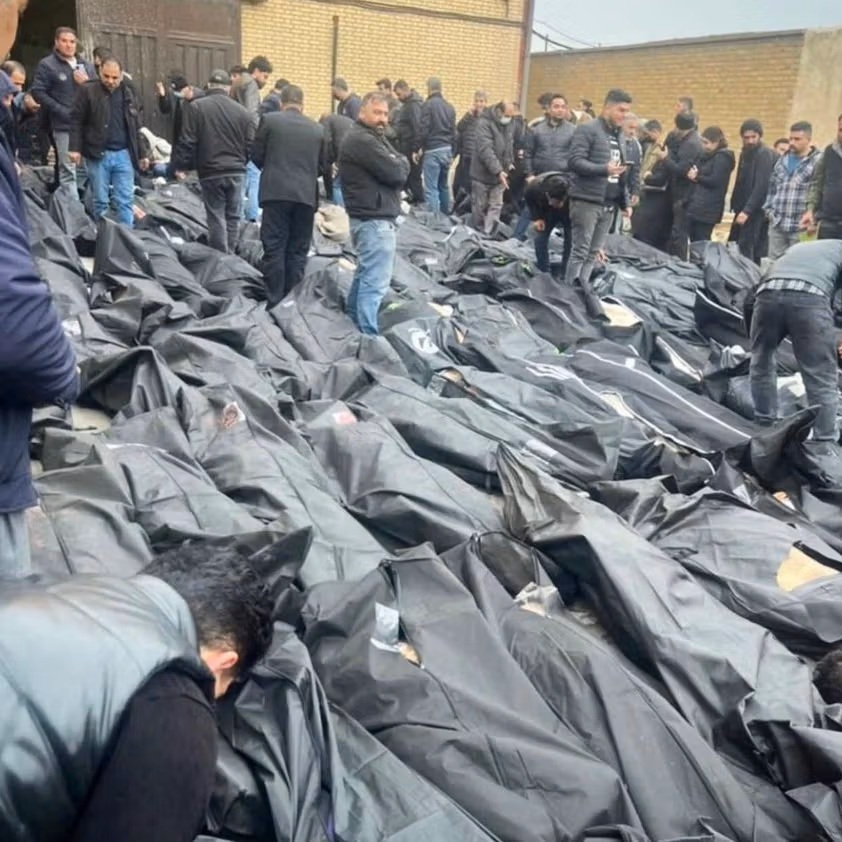
Tens of thousands of people gathered in Beirut Sunday morning to attend the funeral of Hezbollah's former leader, nearly five months after he was killed in an Israeli airstrike on his headquarters in the southern suburb of Beirut. The funeral of the late Hassan Nasrallah and the destruction of Hezbollah's military infrastructure is seen by many as the end of an era where the Shia movement dictated what was good for Beirut. Nasrallah led a life of controversy and disproportional influence.
By Arthur Blok
In the run-up to the funeral, giant portraits of Nasrallah and his slain successor, Sayyed Hashem Safieddine, have been plastered on walls and bridges across south Beirut. One was also hung above a stage erected on the pitch of the Camille Chamoun Sports City Stadium on the capital's outskirts, where the funerals for both leaders were held earlier today.
The stadium has a capacity of around 50,000. Hezbollah installed thousands of extra seats on the pitch and many more outside, where thousands of gathered mourners could follow the ceremony on a giant screen. Since Saturday, it has been almost impossible to go in or out of Beirut, where roads were clogged with carloads of Hezbollah supporters travelling in from the movement's strongholds in south Lebanon and the Bekaa Valley.
The funeral in Beirut today was a highly charged event, marked by the presence of tens of thousands of mourners from all over the region, and a provocative flyover by Israeli fighter jets. The flyover was not to pay Nasrallah a last respect but to convey a 'clear message' to those who threaten Israel, a message that was interpreted by many as a show of strength and a warning to Hezbollah and its supporters.
The veteran Secretary-General has dominated the Lebanese political arena for over three decades. As the leader of the Lebanese Shia Islamist organisation, Nasrallah has been at the centre of numerous controversies, from the liberation of the South in 2000 to the 2006 Lebanon War with Israel, the Syrian Civil War and the war last year with Israel that cost him his life.
Nasrallah was born to a Shia family on August 31, 1960, in Beirut, Lebanon. He became involved in Islamist activism at a young age, joining the Amal Movement, a Shia militia. He soon broke away from Amal and joined Hezbollah, which was founded in 1982 by the Iranian Revolutionary Guard. His rise to power within Hezbollah was rapid. He became the party's secretary-general in 1992 after the assassination of his predecessor, Abbas al-Musawi.
On May 25, 2000, the Israeli army withdrew from territory in Southern Lebanon, marking the end of the South Lebanon conflict (1985–2000). The withdrawal came after the continued attack on Israeli military positions in occupied Lebanese territory by Hezbollah forced Israeli forces to withdraw.
From one day to the other, Hezbollah lost their raison d'être. Refusing to put down arms or merge with the Lebanese army, like many other militiamen who were active in the Lebanese Civil War (1975-1990), Hezbollah gave itself a new role: to disturb the Lebanese political process and be the self-proclaimed protector of the South. A thorn in the eyes of many
After the withdrawal in 2000, Hezbollah saw it as a new mission to secure the release of Lebanese prisoners held captive in Israel. This led to increased cross-border attacks and eventually to the kidnapping of two Israeli soldiers in 2006.
This is one of the most significant controversies from Nasralla’s leadership. Soon after the kidnapping, the whole nation was stuck in a new war, which resulted in the deaths of over 1,000 Lebanese civilians and significant damage to the country's infrastructure.
Nasrallah has also been criticised for his support of the Syrian regime of Bashar al-Assad during the Syrian Civil War. Hezbollah fighters have been instrumental in helping the Assad regime maintain power, leading to accusations of war crimes and human rights abuses. Assad’s regime fell in December, dramatically changing the geopolitics of the region.
Iran's influence in the Middle East has been dealt a severe blow after the Assad regime's collapse and Hezbollah's defeat late last year. The fall of Assad's government has weakened Iran's foothold in Syria, undermining its ability to maintain supply lines to Hezbollah in Lebanon and diminishing its strategic depth.
The consequences are also significant for the Lebanese political status quo. With Syria’s collapse and Hezbollah’s diminishing military might, the new government in Beirut has a golden opportunity to gain complete control over all its territory. It is imminent that the Lebanese government and the Lebanese Armed Forces must implement Resolution 1701 fully.
Today’s commemoration could best be seen as the closing of a long chapter of Shia dominance in Lebanon's political arena. It is a moment that calls for introspection and reflection within the movement and its sponsors in Iran. As the region undergoes significant changes, Hezbollah must consider a new direction and put all energy into the political wing of their movement, or it will be game over for good.





